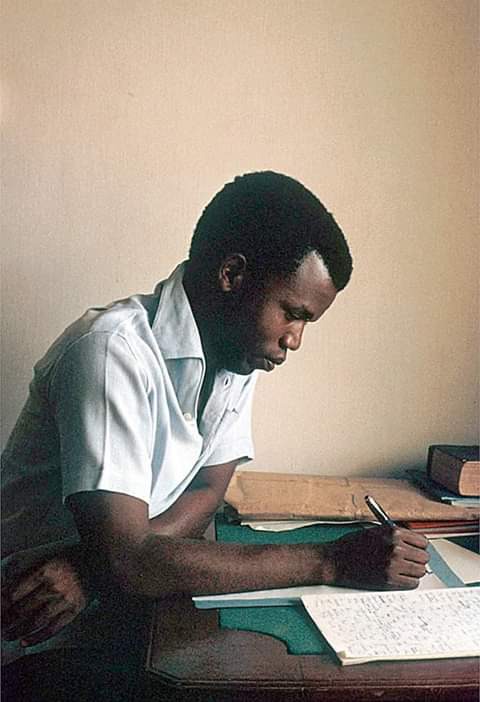The falcon cannot hear the falconer;
Things fall apart; the centre cannot hold;
Mere anarchy is loosed upon the world."
William Butler Yeats- The Second Coming.
Its title borrowed from W.B Yeats "The Second Coming", Things Fall Apart is a novel written by Nigerian author Chinua Achebe. Published in 1958, its story chronicles pre-colonial life in the south-eastern part of Nigeria and the arrival of the Europeans during the late nineteenth century.
Achebe
It is seen as the archetypal modern African novel in English, one of the first to receive global critical acclaim. It is a staple book in schools throughout Africa and is widely read and studied in English-speaking countries around the world. In 1962, Achebe's debut novel was first published in the UK by William Heinemann Ltd. Things Fall Apart was the first work published in Heinemann's African Writers Series.
The novel follows the life of Okonkwo, an Igbo ("Ibo" in the novel) man and local wrestling champion in the fictional Nigerian clan of Umuofia. The work is split into three parts, with the first describing his family, personal history, and the customs and society of the Igbo, and the second and third sections introducing the influence of British colonialism and Christian missionaries on Okonkwo, his family and wider Igbo community.
The work of Okonkwo is basically epitomised by his notoriously famous quote that cowards die many deaths before dying.
Things Fall Apart was followed by a sequel, No Longer at Ease (1960), originally written as the second part of a larger work along with Arrow of God (1964).
Young Achebe with copies of things fall apart
Achebe states that his two later novels A Man of the People (1966) and Anthills of the Savannah (1987), while not featuring Okonkwo's descendants, are spiritual successors to the previous novels in chronicling African history.
THINGS FALL APART WAS WRITTEN IN ENGLISH
Achebe wrote his novels in English because the written standard Igbo language was created by combining various dialects, creating a stilted written form. In a 1994 interview with The Paris Review, Achebe said, "the novel form seems to go with the English language.
There is a problem with the Igbo language. It suffers from a very serious inheritance which it received at the beginning of this century from the Anglican mission. They sent out a missionary by the name of Dennis. Archdeacon Dennis. He was a scholar.

.
Achebe Writing
He had this notion that the Igbo language—which had very many different dialects—should somehow manufacture a uniform dialect that would be used in writing to avoid all these different dialects.
Because the missionaries were powerful, what they wanted to do they did. This became the law. But the standard version cannot sing. There's nothing you can do with it to make it sing. It's heavy. It's wooden. It doesn't go anywhere."
Achebe's choice to write in English has caused controversy. While both African and non-African critics agree that Achebe modelled Things Fall Apart on classic European literature, they disagree about whether his novel upholds a Western model, or, in fact, subverts or confronts it.
Achebe continued to defend his decision: "English is something you spend your lifetime acquiring, so it would be foolish not to use it. Also, in the logic of colonization and decolonization it is actually a very powerful weapon in the fight to regain what was yours.
English was the language of colonization itself. It is not simply something you use because you have it anyway."
Achebe is noted for his inclusion of and weaving in of proverbs from Igbo oral culture into his writing.
This influence was explicitly referenced by Achebe in Things Fall Apart: "Among the Igbo the art of conversation is regarded very highly, and proverbs are the palm-oil with which words are eaten."
Things fall apart is the most read African literature and has been translated into more than 50 known world languages. You can find it in libraries all over the world. This classic African masterpiece sits amongst some of the finest piece of literary works of all time.
Hope you enjoyed this article. Please leave a comment below.
Hope you enjoyed this article. Please leave a comment below.
